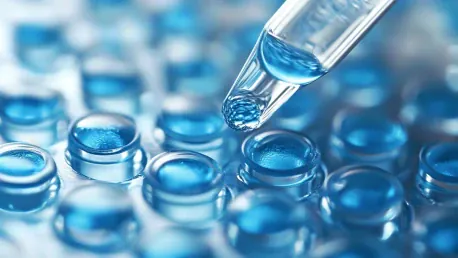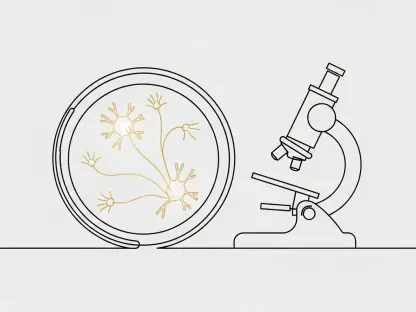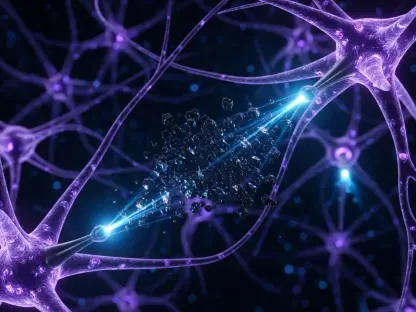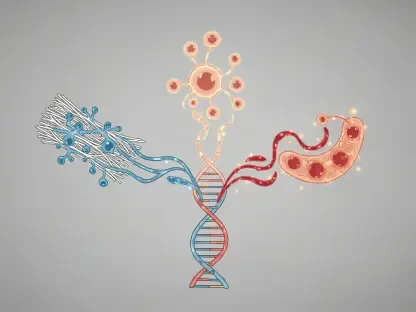The field of oncology has witnessed numerous advancements over the years, but the introduction of molecular glue degraders marks a significant leap forward. These innovative small molecules are poised to transform cancer treatment by targeting previously “undruggable” proteins, offering new hope for patients with limited therapeutic options. Unlike traditional drugs that generally serve as agonists or antagonists and necessitate ongoing interaction with their targets, molecular glue degraders operate through a distinct mechanism that leads to the irreversible inactivation of the target proteins.
Molecular glue degraders have catalyzed a paradigm shift in the realm of drug development. They aim to degrade rather than inhibit or activate their targets, cumulatively leading to a permanent removal of the target protein from the cellular environment. This game-changing approach enables a new trajectory for cancer therapy. By recruiting E3 ubiquitin ligase in cells, these molecules successfully tag the proteins for degradation, thus dismantling a key player in cancer progression. This intervention is expected to fill the gap for patients who have few treatment avenues available.
The Emergence of Molecular Glue Degraders
Molecular glue degraders represent a novel class of small molecules facilitating the degradation of target proteins through recruitment of E3 ubiquitin ligase. This process leads to ubiquitination and subsequent degradation of the target protein, effectively purging it from the cell. Unlike conventional small molecule drugs functioning as agonists or antagonists, molecular glue degraders boast a unique action mechanism, allowing them to catalyze degradation continuously without their own consumption during the process.
The concept of molecular glue degraders has gained remarkable traction due to their potential to target proteins once considered “undruggable.” These proteins often play crucial roles in cancer’s progression, rendering their elimination highly advantageous therapeutically. By adapting this method, previously untargetable proteins can now be efficiently degraded, opening previously unexplored pathways in cancer treatment. This development promises significant improvements for patients battling cancers with traditionally few therapeutic options, forging a potential revolution in oncology.
Molecular glue degraders operate very differently than traditional treatments that often involve gene mutations or external cellular interference. These small molecules function precisely within the cellular machinery, orchestrating the ubiquitous tagging of proteins for natural degradation within the cell’s own garbage disposal system. This remarkable capability marks an evolution in therapeutic approaches, expanding potential targets far beyond the reach of existing solutions.
Strategic Partnerships Driving Innovation
One of the main drivers behind the development of molecular glue degraders is the strategic partnership between Evotec SE and Bristol Myers Squibb (BMS). This collaboration, initiated in 2018, aims to develop a robust pipeline of molecular glue degraders, leveraging Evotec’s high-performance multi-omics screening and analytics capabilities along with BMS’s extensive library of cereblon E3 ligase modulators (CELMoDs™). By combining Evotec’s innovative technology with the extensive experience of BMS, the partnership is well equipped to advance the frontiers of drug discovery and development.
The partnership has already demonstrated significant outcomes, with performance-based and program-based payments totaling US$75 million being activated due to the accomplishment of specific milestones. The collaboration was further extended in May 2022, reinforcing the success and productivity of the alliance, which is now projected to last until 2030. This long-term commitment underscores the belief that molecular glue degraders have the potential to transform cancer treatment comprehensively. Such partnerships exemplify how collaborative efforts can propel revolutionary advancements in healthcare.
Strategic collaboration between biotech firms like Evotec and pharmaceutical giants such as BMS showcases an ideal model for success in this rapidly evolving field. By pooling their unique strengths and resources, they can accelerate the development and implementation of innovative therapies. This approach not only fosters technological progress but also ensures that these groundbreaking treatments reach patients as swiftly as possible, significantly benefiting clinical outcomes and extending opportunities for new therapeutic avenues.
Technological Platforms Enhancing Drug Discovery
Evotec’s PanOmics and PanHunter platforms play a crucial role in the development of molecular glue degraders. PanOmics screening provides an unparalleled throughput to screen compounds for potential therapeutic efficacy, while PanHunter helps in integrating and analyzing high-dimensional biological data to identify the best candidates for further development. These platforms enable a data-driven approach to drug discovery, ensuring that the most promising compounds are identified and advanced through the development pipeline. This data-centric method illustrates a significant leap forward in precision medicine.
In 2022, PanHunter was introduced commercially as a software-as-a-service (SAAS) solution aimed at enhancing data-driven decision-making in drug development. This innovation highlights the importance of integrating cutting-edge technology with scientific research to accelerate the discovery and development of new therapies. This software enables scientists to manage and interpret vast amounts of biological data swiftly, allowing for real-time decision-making and refinement of drug candidates. Ensuring the development process is driven by data not only boosts efficiency but also fosters innovative science with the potential for groundbreaking discoveries.
The utilization of PanOmics and PanHunter platforms demonstrates the significant role of technological innovation in biotechnology. By automating and refining the capturing, screening, and analysis processes, these platforms place an emphasis on efficiency and thoroughness, reducing time to discovery and increasing the precision of results. This methodical sophistication is setting a standard for future drug development, where precision and speed are both paramount in responding to critical healthcare needs.
Expanding the Druggable Proteome
The success of molecular glue degraders lies in their ability to expand the druggable proteome, targeting proteins that were previously considered inaccessible by traditional methodologies. This expansion is particularly significant in the field of oncology, where many critical proteins involved in cancer progression have been challenging to target with conventional drugs. The ability to degrade these challenging proteins means that diseases previously considered untreatable might now see new and effective treatments on the horizon, driving a monumental shift in therapeutic strategies.
By facilitating the degradation of these proteins, molecular glue degraders offer a new therapeutic modality that could lead to the development of first-in-class and best-in-class pharmaceutical products. This approach not only addresses unmet medical needs but could also become a cornerstone of future cancer treatments. The promise of intervening with proteins previously designated as “undruggable” signals a significant paradigm shift in how the industry views potential targets, making way for innovative treatments that were once inconceivable.
Expanding the druggable proteome means that researchers can now consider a wider range of biological targets, thus opening the floodgates of potential therapeutic innovations. This shift broadens the spectrum of treatable conditions and supports the development of highly specialized drugs that can more effectively combat diseases at their root cause. It represents the advent of a new era in medicinal chemistry where no target is out of reach, thus propelling the treatment methodologies from generalized approaches to highly specific precision medicine.
Implications for Oncology and Beyond
The implications of molecular glue degraders extend beyond oncology, with potential applications in various therapeutic areas. The ability to target previously “undruggable” proteins could lead to breakthroughs in treatments of diseases with high unmet medical needs, offering new hope for patients across a range of conditions. For example, neurodegenerative conditions, metabolic disorders, and even infectious diseases might eventually benefit from this innovative approach, predicated on the same principle of targeted protein degradation.
The strategic alliance between Evotec and BMS aims to fast-track the development of these innovative therapies, ensuring they reach patients as quickly as possible. This collaborative effort reflects a broader industry trend toward precision medicine and targeted therapies, emphasizing specific, potent interventions with fewer systemic side effects. It also underscores the role of partnerships in driving rapid and effective development of new treatments, which is paramount when facing diseases where time is a crucial factor in patient outcomes.
The expanding applications of molecular glue degraders affirm their potential in transforming modern therapeutics. Beyond oncology, their utility in treating a myriad of other conditions demonstrates the versatile nature of this technology. By diverging from traditional drug development constraints, these degraders open unexplored pathways for treating diseases, solidifying their role as a pivotal tool in the future of medicine. This innovation could herald a new dimension of healthcare, wherein treatments are customized and precision-engineered to address specific protein pathologies.
Future Trajectory and Industry Impact
The field of oncology has seen many advancements, but the introduction of molecular glue degraders marks a significant breakthrough. These innovative small molecules promise to revolutionize cancer treatment by targeting previously “undruggable” proteins, offering new hope for patients with limited treatment options. Unlike traditional drugs that act as agonists or antagonists and require continuous interaction with their targets, molecular glue degraders work through a unique mechanism that results in the irreversible inactivation of the target proteins.
Molecular glue degraders have sparked a paradigm shift in drug development. Instead of inhibiting or activating their targets, they aim to degrade them, leading to the permanent elimination of the target protein from the cell. This groundbreaking approach opens new doors for cancer therapy. By recruiting E3 ubiquitin ligase within cells, these molecules tag proteins for degradation, dismantling essential players in cancer progression. This intervention holds promise for patients with few treatment options, potentially filling a critical gap in current cancer therapies.









